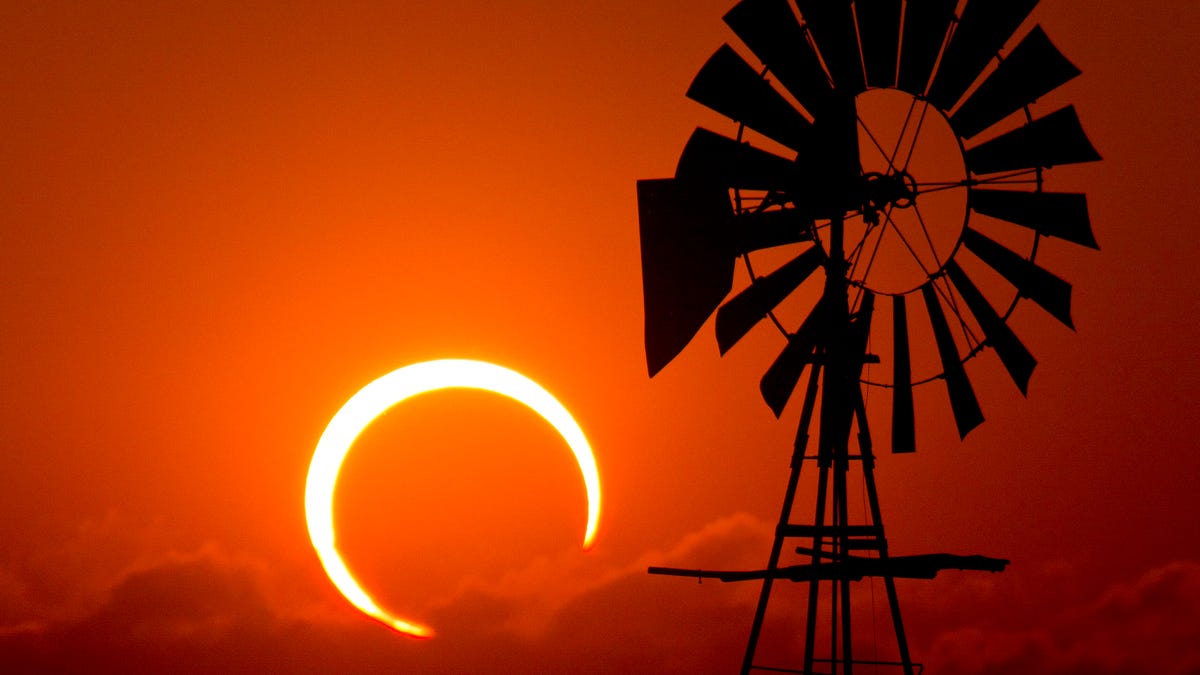Here's What the Solar Eclipse Will Do to All Our Solar Panels
On April 8, the solar eclipse will block out the sun for a lot of solar panels. Here's how it will affect the grid.

The solar eclipse on April 8, like this one in 2012 in Lubbock, Texas, will affect solar power. Utilities have had plenty of time to prepare
The solar eclipse on April 8 will have hordes of Americans' heads craning skyward in their eclipse glasses. But this rare event might lead you to have more worries than just the possibility of damaging your vision.
With an energy ecosystem increasingly fueled by the power of sunlight, the sky going dark at midday is a big deal. "The impacts on solar generation are actually quite significant," Barry Mather, chief engineer at the National Renewable Energy Laboratory, told CNET.
Fortunately, because solar eclipses are extraordinarily predictable, grid operators have had plenty of time to prepare for the effects. Because of that, it's unlikely most Americans will notice any changes to the electrical system.
Can solar panels save you money?
Interested in understanding the impact solar can have on your home? Enter some basic information below, and we’ll instantly provide a free estimate of your energy savings.
Here's what the 4-minute eclipse means for our electrical grid.
Does the solar eclipse affect solar panels?
A solar eclipse, which causes a temporary loss of sunlight as the moon blocks its rays, matters a lot for the ever-growing supply of solar power deployed in the US.
"The grid will have to figure out, if that energy source goes away even for a few minutes, how to match supply and demand during that window," said Benjamin Lee, a professor of electrical and systems engineering at University of Pennsylvania.
It might seem like just a blip -- the total loss of sunlight will last only for 4 minutes in any one place -- but that overlooks the broader impacts of the eclipse.
Areas inside the "zone of totality" will experience total darkness, but areas near and far from that zone will still experience a partial loss of sunlight. Plus, although the duration of totality is only 4 minutes, the transition in and out of the eclipse could last several hours in some places. That means a much longer period of reduced solar generation.
"It really will impact the entire United States to various degrees," Mather said.
The effects could be especially acute in Texas, which has increased its reliance on solar in recent years and is directly in the path of totality, according to Jin Tan, principal engineer at NREL.
Will the solar eclipse affect the electric grid?
The nationwide loss of sunlight during the eclipse will reduce solar generation. But that's not only an issue for individual homeowners will rooftop solar -- it's also a big hit to the electrical grid.
That's because utilities have invested in many large-scale solar projects that they now rely on to keep the grid running. Each utility is preparing for the eclipse in a unique way, Tan said, but generally they'll need to ramp up other sources of power (like oil, gas and hydro plants) to cover the temporary loss of solar power.
This can be challenging due to the speed of the eclipse, Tan said. The daily transition to night time, which obviously reduces solar generation, is quite slow. But the rate of transition during the eclipse could be almost twice as fast, meaning utilities need to boost other power sources very quickly.
The good news is that this is all predictable, and utilities have been here before, most recently in 2017. A report from NREL notes that "the 2017 total solar eclipse came and went without causing any issues to the operation of the North American electric power system." There is considerably more utility-scale solar now than there was in 2017, but if all goes according to plan, electric consumers shouldn't notice any kind of blip at all.
There are also many more batteries in operation than in 2017. Energy storage helps "balance the electricity system" by storing excess energy and releasing it when it's needed, the Energy Information Administration said. During the last eclipse only 0.6 gigawatts of battery storage was available on the grid, according to the EIA. Now there are 15.4 gigawatts of batteries.
And here's one other silver lining: "This is like a practice run for events that … will be less predictable and will happen in the future," Mather said, such as freak storms or wildfire smoke hurting solar generation without warning.
How to watch the solar eclipse
If you want to get out there and gaze up at this celestial spectacle, here are some tips:
- Grab a reliable pair of solar viewers or filters and protect your eyes. (You can even get them for free at Warby Parker in April.)
- Check out the map of totality to see the nearest viewing spot close to where you live.
- You can use an app or some other tricks to get the best photos.
- If you do get out into the zone of totality, don't stare into the eclipse for too long, and make sure to wear the filters before and after totality to prevent eye damage.



